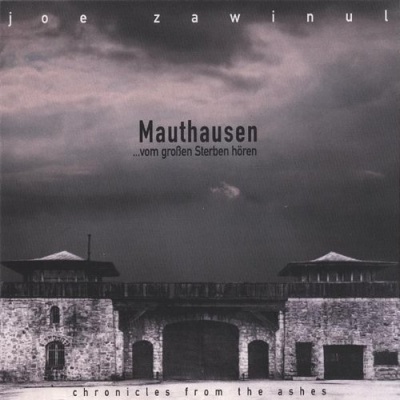
Mauthausen
by Richard S. Ginell A little-known anomaly in the Joe Zawinul discography, Mauthausen was a multimedia event in which the Austrian-born composer/keyboardist tried to come to terms with some of the darkest hours in his country's history. It is a troubling, at times eloquent electronic tone poem that depicts life within the concentration camp near the small Austrian town of Mauthausen, where approximately 120,000 people lost their lives between the years 1938 and 1945. Anticipating limited appeal for such a project, ESC released the album only in Austria and a handful of other Central European countries. Originally presented in the camp itself in 1998 with holograms, lighting effects, and 50 speakers placed around the audience, Mauthausen is mostly a one-man show on CD; Zawinul commanding his symphonic arsenal of keyboards, with occasional narrations in German by actor Frank Hoffmann. As have a number of recent Zawinul albums, this one opens with a deep, moody pedal point in the bass, but the mood stays dark and threatening most of the way through -- a stark contrast to the bubbly, life-affirming rhythms that Zawinul had been pumping out on his jazz/world music recordings of this time. Once in a great while, a semblance of the Zawinul groove breaks out, but always in a subdued way. Mixed in are collages of storm-troopers, trains carrying the prisoners to the camp, prison doors slamming, commands of the guards, and other sound effects from wartime. As in Zawinul's symphonic poem Stories of the Danube, echoes from his jazz past turn up; this time, we hear spliced-in recordings of "Walking on a Nile" from Zawinul's Dialects. and "The Orphan" from Weather Report's 8:30 album. The latter insert is particularly appropriate, with Wayne Shorter's tenor sax and a children's chorus shouting "No More! No More!" contributing beacons of hope before Zawinul's final hymn of benediction. Obviously, for non-German speakers, some of the meaning of the piece will be lost; the booklet contains no English translations other than a brief history of the camp and the titles of the selections. But the inhumane, brooding atmosphere of the camp comes through powerfully enough in the music via a stereo CD. Although Mauthausen is not something one is likely to pull off the shelf too often, it is essential for those who want to understand all of Zawinul's long musical odyssey, and it deserves a wider release.
